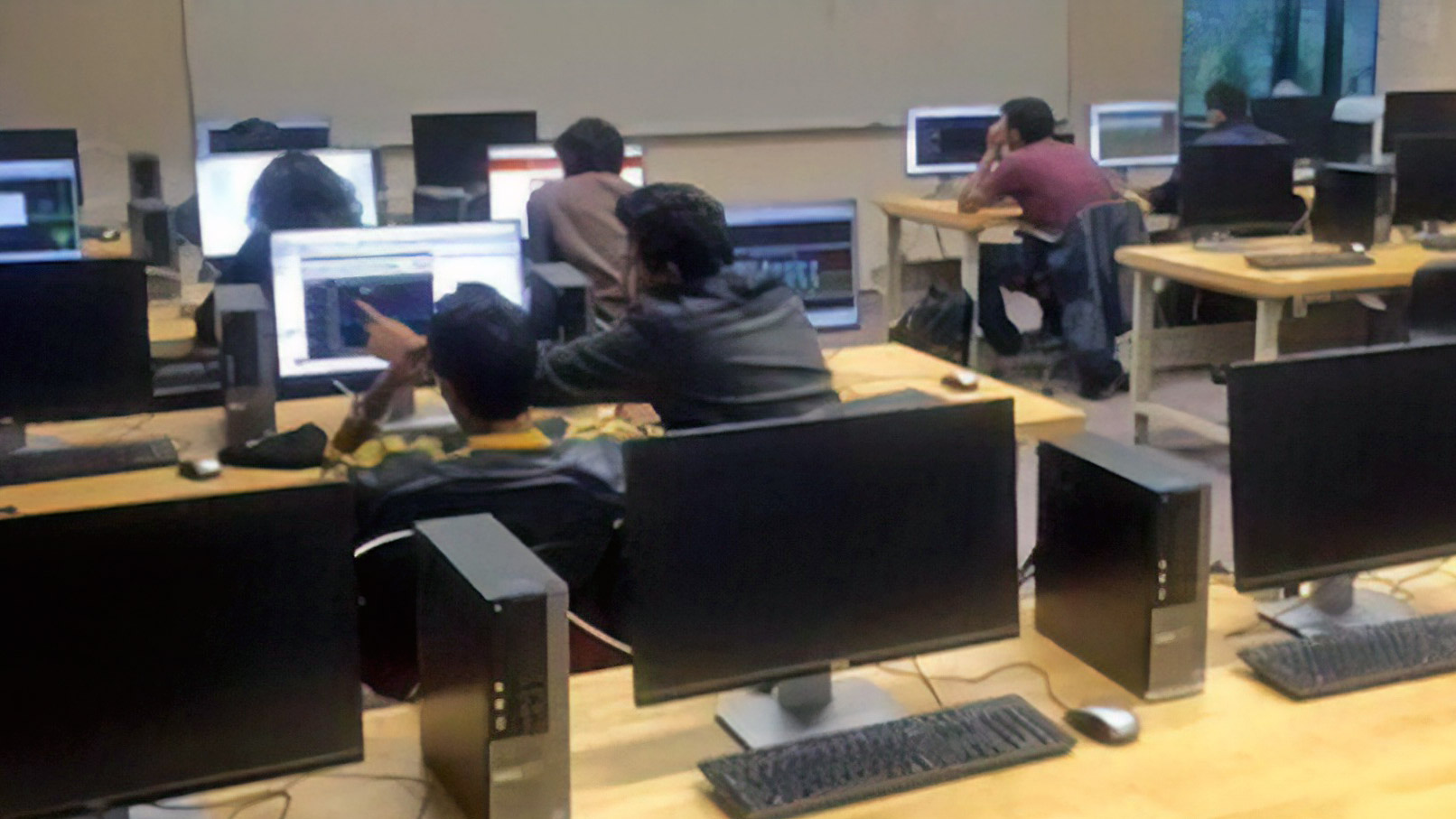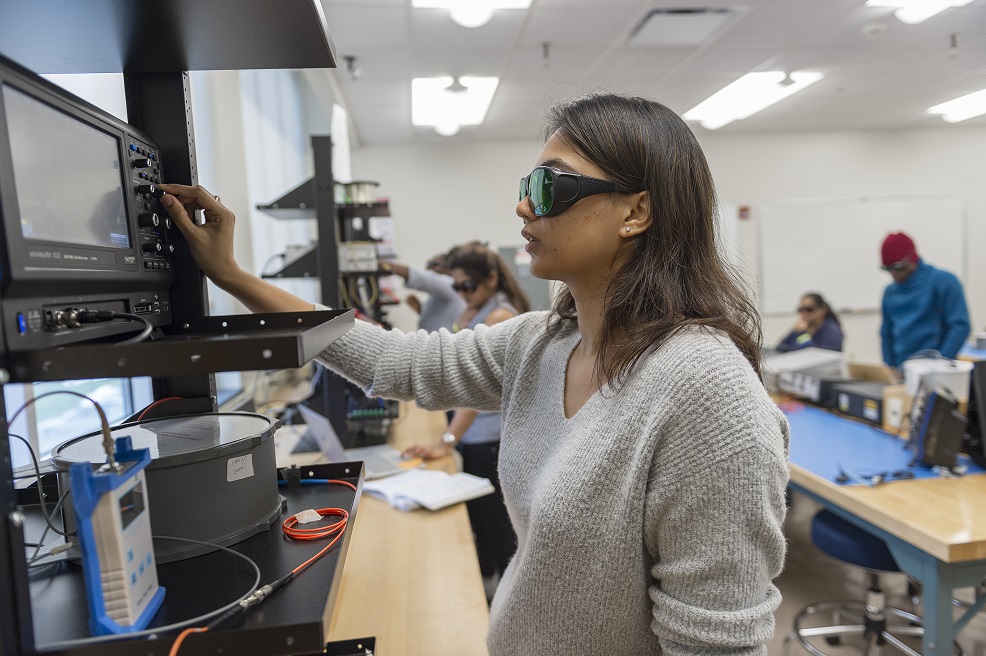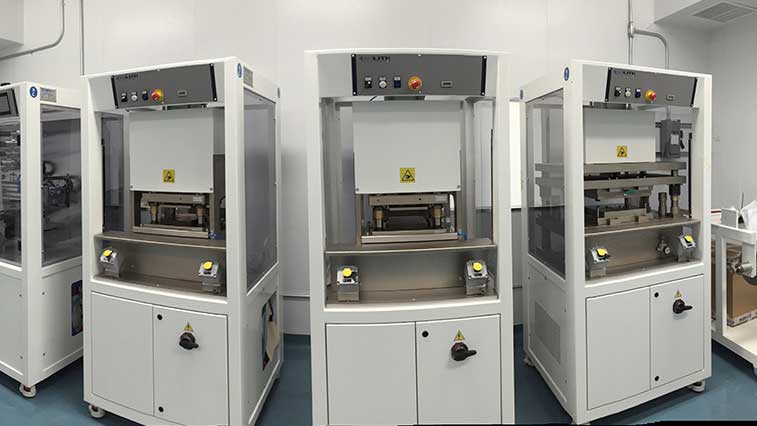Microsystems Engineering Doctor of Philosophy (Ph.D.) Degree


Microsystems Engineering
Doctor of Philosophy (Ph.D.) Degree
- RIT /
- Rochester Institute of Technology /
- Academics /
- Microsystems Engineering Ph.D.
Request Info about graduate study
Visit
Apply
Conduct research in nano-engineering, design methods, and technologies for micro- and nano-scaled systems. This microsystems engineering doctorate is a multidisciplinary program that addresses the technical challenges of micro- and nano-systems.
Overview for Microsystems Engineering Ph.D.
- Renowned, multidisciplinary faculty from RIT’s Kate Gleason College of Engineering and College of Science who share resources and expertise over a wide variety of micro- and nano-scale technologies.
- Unique state-of-the-art research laboratories–including a semiconductor and microsystems fabrication clean-room (RIT Nano Fab)–constitute part of the research facilities, providing students access to the most advanced micro- and nano-electronic processing capabilities.
- Explore applications of microsystems and nanotechnology through close collaboration with industry and government laboratories.
- Graduates have discovered exciting opportunities in new technology frontiers
The multidisciplinary doctorate degree in microsystems engineering builds on the fundamentals of traditional engineering and science combined with curriculum and research activities addressing the numerous technical challenges of micro- and nano-systems. These include the manipulation of electrical, photonic, optical, mechanical, chemical, and biological functionality to process, sense, and interface with the world at a nanometer scale. This nanotechnology Ph.D. program provides a foundation to explore future technology through research in nano-engineering, design methods, and technologies and their integration into micro- and nano-scaled systems.
The microsystems engineering doctorate includes the following areas of exploration:
- Next-generation nanoelectronics include:
- development of new techniques, processes, and architectures for nanoelectronic and nano-optoelectronic devices
-
- exploration into new materials research including thin-film electronics, III-V materials, 2D materials, carbon nanotubes, and spintronics
- Scaled micro- and nano-electronics for integration into biomedical systems
- Photonics and Optoelectronics Research including:
- Photonic Integrated Circuits for computing, communications, and sensing.
- Light emitters (Lasers, LEDs/micro-LEDs)
- Research in biosensing, imaging and detection
- Quantum optics and photonics
- Photovoltaic research in compound semiconductors (III-V), and organic solar cells
- Neuromorphic devices and circuits for machine learning, and the use of artificial intelligence to design nanomaterials and microsystems
- Nanomaterials research including nanoparticles, nanowires, nanotubes, quantum dots, self-assembly materials, and their applications in electronics, optics, and materials science
- MEMS(micro-electro-mechanical systems), MEOMS (micro-electro-optical-mechanical systems), and NEMS (nano-electro-mechanical systems) device, processing, and materials research for smart sensors, actuators, biochips, and micro-implantable appliances
- Microfluidics research on the behavior, control, and manipulation of fluids at the micro-scale
Mission
The program fulfills a critical need for an expanded knowledge base and expertise in the innovation, design, fabrication, and application of micro- and nano-scale materials, processes, devices, components, and systems. RIT is an internationally recognized leader in education and research in the fields of microsystems and nanoscale engineering.
The curriculum is structured to provide a sound background and a thorough foundation in engineering and science through world-class education in the innovative application of educational technologies and research experiences.
Plan of Study
A combination of graduate course work and research is required for completion of the program. The course work requires a combination of foundation courses, major and minor technical area courses, and electives. The student must pass the qualifying exam, the candidacy exam, and the dissertation defense exam to complete the degree requirements.
Phase 1–Qualifying: The first phase prepares students with the foundation in science and engineering required for the program as well as to determine the student's ability to do independent research. This includes the foundation and specialization courses taken during the first year together with the successful completion of the qualifying exam. The qualifying exam tests the student’s ability to think and learn independently, to critically evaluate current research work in microsystems engineering, and to use good judgment and creativity to determine appropriate directions for future research work.
Phase 2–Candidacy: The second phase continues students' course work and preliminary dissertation research. Much of this course work supports the dissertation research to be conducted in the third phase. This phase is completed when the student has finished most of the formal course work as prescribed in the program of study, has prepared the dissertation proposal, and has passed the candidacy examination.
Phase 3–Defense: The third phase includes the completion of the experimental and/or theoretical work needed to complete the student’s dissertation along with the required publication of results. The research review milestone is held as a meeting during this phase, as is the defense of the dissertation, which consists of a public oral presentation and examination.
The course work requirements are divided into four parts to ensure that students complete a well-rounded program of study with the necessary concentration in their specialized field.
Foundation courses
Four foundation courses and the Microsystems Ph.D. Seminar (MCSE-795) are mandatory for all students. Foundation courses consist of Microelectronic Fabrication (MCEE-601), Introduction to Nanotechnology and Microsystems (MCSE-702), Material Science for Microsystems Engineering (MCSE-703), and Theoretical Methods in Materials Science and Engineering (MTSE-704).
Major technical interest area
Students complete a sequence of three courses in the major technical research area and a sequence of two courses in a support area.
Minor technical interest areas
Students complete a two-course sequence in a minor technical area which should be outside of the student's undergraduate degree major.
Elective courses
Students complete at least two elective courses, in addition to the foundation and technical interest courses.
General course requirements
The total number of credit hours required for the degree depends upon the highest degree level completed by the student before entering the program. Students entering without prior graduate work must complete a minimum of 39 credit hours of course work as outlined above. A minimum of 18 research credits and a total of 66 total credits are required. Credits beyond the minimum of 39 course and 18 research requirements can be taken from either category to reach the 66 credit total.
Students entering the program with a master’s degree may be permitted up to 24 course credit hours toward those required for the degree, based on the approval of the program director.
All students are required to maintain a cumulative grade-point average of 3.0 (on a 4.0 scale) to remain in good standing in the program.
Preparing a program of study
Students should prepare a program of study after passing the qualifying exam and no later than the spring semester of the second year. The program of study should be reviewed periodically by the student and the advisor, and modifications should be made as necessary. Leading up to or upon completion of the candidacy exam, the student’s advisor and the advisory committee may add additional course work requirements to ensure the student is sufficiently prepared to carry out and complete their dissertation research.
Qualifying examination
Every student must take the qualifying examination, which tests the student’s ability to think and learn independently, to critically evaluate current research work in the field of microsystems engineering, and to use good judgment and creativity to determine appropriate directions for future research work. The exam must be completed successfully before a student can submit a thesis proposal and attempt the candidacy examination.
Research proposal
A research topic is chosen by the student and their research advisor becomes the basis for the dissertation. The research proposal sets forth both the exact nature of the matter to be investigated and a detailed account of the methods to be employed. In addition, the proposal usually contains material supporting the importance of the topic selected and the appropriateness of the research methods to be employed.
Advising
Doctoral students’ work is overseen by an advisor, the advisory committee, and the program’s director.
Candidacy examination
The candidacy examination is an oral examination based on the dissertation research proposal and allows the advising committee to judge the student's ability to execute a research task and to communicate the results. The exam also serves to evaluate the proposed topic to ensure that if completed as posed it constitutes an original contribution to knowledge.
Research review milestone
The research review milestone is administered by the student's advisor and the advisory committee between the time the student passes the candidacy exam and registers for the dissertation defense. This normally occurs approximately six months prior to the Dissertation Defense.
Dissertation defense and examination
The culmination of a student’s work toward the doctorate degree is the publication of their research. In addition to developing experimental and technical skills during the creation of research, a student needs to acquire the necessary literary skills to communicate results to others. The preparation of the proposal and the dissertation manuscripts will demonstrate these skills. It is also expected that these skills are developed through the publication of technical papers and communications. The dissertation defense and examination is scheduled after all course requirements for the degree have been successfully completed.
Additional details regarding program requirements can be found in the Microsystems Engineering Ph.D. Graduate Student Manual.
Student Resources
The microsystems engineering Ph.D. offers a variety of resources for our students that range from academic support to handbooks and more. View our student resources for more information.
Students are also interested in: Microelectronic Engineering MS
Join us for Fall 2024
Many programs accept applications on a rolling, space-available basis.
Research
Microsystems engineering builds on the fundamentals of traditional engineering and science to process, sense, and interface with the world at the micro- and nano-scales. Innovative research programs span across fields of biomedical, electronic, photonic, mechanical, materials, and computing engineering and sciences. Research opportunities span multiple areas of expertise, including:
- NanoBio Devices
- Biomedical Microsystems
- NanoPhotonics
- Thin-Film Electronics
- Photovoltaics and Optoelectronic Devices and the Nanopower Research Labs
- Nanopatterning, Nanolithography, and Materials
- Multi-Agent Bio Robotics
- Nanoelectronic Devices
- Semiconductor Photonics and Electronics
- Nano-optomechanics
- Microscale Bio Separations
- Carbon Nanotubes
- Coloids and Surface Science
- Thermal Analysis, Microfluidics, and Fuel Cells
- Fluorescent Spectroscopy
- Nano-Bio Interfaces
Research Assistantships
Research assistantships are available to doctoral students. Learn more about the college's research assistantship opportunities and how you can apply.
High-Tech Labs
Visit our NanoPower Research Laboratories and the Future Photon Initiative to view research initiatives and opportunities for advanced study.
Featured Profiles
Alumni Spotlight: Matt Hartensveld '18, '21
Matthew Hartensveld BS, MS '18, Ph.D. '21 is the CTO and co-founder of the display startup Innovation Semiconductor, a company pursuing a novel platform for the next generation of display technology.
Latest News
-
June 12, 2024
![the cover of a paper titled High-Dimensional quantum entanglement on a chip is shown.]()
Ph.D. student is lead author on paper published on cover of 'Optica Quantum'
Microsystems engineering Ph.D. student Evan Manfreda-Schulz ’20 (physics) accomplished something many academic researchers aim for when his first paper was published on the cover of Optica Quantum.
-
January 26, 2024
![researcher standing next to a desk with various pieces of lab equipment.]()
STEM degrees, co-ops draw international students
Each year, RIT welcomes nearly 2,000 students from more than 100 countries to its campus. The draw of a top-notch STEM education, along with a nationally ranked co-op and internship program and an increasing global reach with numerous opportunities for programmatic exchanges, gives students the chance for real-world work experiences and career focus.
-
December 1, 2023
![graphic with the text, 20 23 to 20 24 distinguished alumni awards.]()
Distinguished Alumni Award winners named for 2023-2024
Twelve RIT alumni have been honored with Distinguished Alumni Awards for the 2023-2024 year. The Distinguished Alumni Awards are presented annually by each of RIT’s nine colleges, the School of Individualized Study, and the RIT Graduate School to alumni who have performed at the highest levels of their profession or who have contributed to the advancement and leadership of civic, philanthropic, or service organizations.
Curriculum Update in Process for 2024-2025 for Microsystems Engineering Ph.D.
Current Students: See Curriculum Requirements
Microsystems Engineering, Ph.D. degree, typical course sequence
| Course | Sem. Cr. Hrs. | |
|---|---|---|
| First Year | ||
| MCEE-601 | Microelectronic Fabrication This course introduces the beginning graduate student to the fabrication of solid-state devices and integrated circuits. The course presents an introduction to basic electronic components and devices, lay outs, unit processes common to all IC technologies such as substrate preparation, oxidation, diffusion and ion implantation. The course will focus on basic silicon processing. The students will be introduced to process modeling using a simulation tool such as SUPREM. The lab consists of conducting a basic metal gate PMOS process in the RIT clean room facility to fabricate and test a PMOS integrated circuit test ship. Laboratory work also provides an introduction to basic IC fabrication processes and safety. (Prerequisites: Graduate standing in the MCEE-MS or MCEMANU-ME program or permission of instructor.) Lab 3, Lecture 3 (Fall). |
3 |
| MCSE-702 | Introduction to Nanotechnology and Microsystems This course will introduce first year Microsystems Engineering students to microsystems and nanotechnology. Topics include, micro and nano systems; MEMS, bioMEMS, MOEMS, and NEMS; nanomaterials; nanopatterning; characterization and analytical techniques; self-assembly approaches; nanoelectronics and nanophotonics; nanomagnetics; organic electronics; and microfluidics. The course will be taught by faculty in the individual fields of nanotechnology and microsystems. (This course is restricted to students in the MCSE-PHD program or those with permission of instructor.) Lecture 3 (Fall). |
3 |
| MCSE-703 | Material Science for Microsystems Engineering The intent of this course is to provide a comprehensive review of the fundamental concepts of materials science and engineering with applications to nano- and microsystems. Topics include crystallography, diffusion, phase diagrams, fluids, and thermal, elastic, electrical, optical and magnetic properties. This course provides students in the engineering or science fields of nano- and microsystems with the background for future coursework and research in materials engineering and applications. (This course is restricted to students in the MCSE-PHD program or those with permission of instructor.) Lecture 3 (Spring). |
3 |
| MCSE-795 | Microsystems Ph.D. Seminar In this seminar course students will present their latest research and learn about the research taking place in the program. All Microsystems Ph.D. students enrolled full time are required to attend each semester they are on campus. (This course is restricted to students in the MCSE-PHD program or those with permission of instructor.) Lecture 1 (Fall, Spring). |
2 |
| MCSE-892 | Graduate Research Doctoral-level research by the candidate on an appropriate topic as arranged between the candidate and the research advisor. Students may count a maximum of 9 credits towards degree requirements. If the student enrolls cumulatively in more than 9 credits, the additional credits above 9 will not be counted towards the degree. Research 40 (Fall, Spring, Summer). |
1 |
| MTSE-704 | Theoretical Methods in Materials Science and Engineering This course includes the treatment of vector analysis, special functions, waves, and fields; Maxwell Boltzmann, Bose-Einstein and Fermi-Dirac distributions, and their applications. Selected topics of interest in electrodynamics, fluid mechanics, and statistical mechanics will also be discussed. (This class is restricted to degree-seeking graduate students or those with permission from instructor.) Lecture 3 (Fall). |
3 |
Major Technical Area Electives |
6 | |
| Second Year | ||
| MCSE-795 | Microsystems Ph.D. Seminar In this seminar course students will present their latest research and learn about the research taking place in the program. All Microsystems Ph.D. students enrolled full time are required to attend each semester they are on campus. (This course is restricted to students in the MCSE-PHD program or those with permission of instructor.) Lecture 1 (Fall, Spring). |
2 |
| MCSE-892 | Graduate Research Doctoral-level research by the candidate on an appropriate topic as arranged between the candidate and the research advisor. Students may count a maximum of 9 credits towards degree requirements. If the student enrolls cumulatively in more than 9 credits, the additional credits above 9 will not be counted towards the degree. Research 40 (Fall, Spring, Summer). |
4 |
Major Technical Area Electives |
6 | |
Minor Technical Area Electives |
6 | |
| Third Year | ||
| MCSE-795 | Microsystems Ph.D. Seminar In this seminar course students will present their latest research and learn about the research taking place in the program. All Microsystems Ph.D. students enrolled full time are required to attend each semester they are on campus. (This course is restricted to students in the MCSE-PHD program or those with permission of instructor.) Lecture 1 (Fall, Spring). |
2 |
| MCSE-890 | MCSE-Dissertation Research in an appropriate topic as arranged by doctoral candidate and dissertation adviser in fulfillment of the dissertation requirement. (Enrollment in this course requires permission from the department offering the course.) Thesis (Fall, Spring, Summer). |
6 |
| MCSE-892 | Graduate Research Doctoral-level research by the candidate on an appropriate topic as arranged between the candidate and the research advisor. Students may count a maximum of 9 credits towards degree requirements. If the student enrolls cumulatively in more than 9 credits, the additional credits above 9 will not be counted towards the degree. Research 40 (Fall, Spring, Summer). |
4 |
Technical Elective |
3 | |
| Fourth Year | ||
| MCSE-890 | MCSE-Dissertation Research in an appropriate topic as arranged by doctoral candidate and dissertation adviser in fulfillment of the dissertation requirement. (Enrollment in this course requires permission from the department offering the course.) Thesis (Fall, Spring, Summer). |
9 |
| Choose one of the following: | 3 |
|
| MCSE-890 | MCSE-Dissertation Research in an appropriate topic as arranged by doctoral candidate and dissertation adviser in fulfillment of the dissertation requirement. (Enrollment in this course requires permission from the department offering the course.) Thesis (Fall, Spring, Summer). |
|
Approved Graduate Elective |
||
| Total Semester Credit Hours | 66 |
|
Admissions and Financial Aid
This program is available on-campus only.
| Offered | Admit Term(s) | Application Deadline | STEM Designated |
|---|---|---|---|
| Full‑time | Fall | January 15 priority deadline, rolling thereafter | Yes |
Full-time study is 9+ semester credit hours. International students requiring a visa to study at the RIT Rochester campus must study full‑time.
Application Details
To be considered for admission to the Microsystems Engineering Ph.D. program, candidates must fulfill the following requirements:
- Complete an online graduate application.
- Submit copies of official transcript(s) (in English) of all previously completed undergraduate and graduate course work, including any transfer credit earned.
- Hold a baccalaureate degree (or US equivalent) from an accredited university or college in the physical sciences or engineering.
- A recommended minimum cumulative GPA of 3.0 (or equivalent).
- Submit a current resume or curriculum vitae.
- Submit a statement of purpose for research which will allow the Admissions Committee to learn the most about you as a prospective researcher.
- Submit two letters of recommendation.
- Entrance exam requirements: GRE optional but recommended. No minimum score requirement.
- Writing samples are optional.
- Submit English language test scores (TOEFL, IELTS, PTE Academic), if required. Details are below.
English Language Test Scores
International applicants whose native language is not English must submit one of the following official English language test scores. Some international applicants may be considered for an English test requirement waiver.
| TOEFL | IELTS | PTE Academic |
|---|---|---|
| 94 | 7.0 | 66 |
International students below the minimum requirement may be considered for conditional admission. Each program requires balanced sub-scores when determining an applicant’s need for additional English language courses.
How to Apply Start or Manage Your Application
Cost and Financial Aid
An RIT graduate degree is an investment with lifelong returns. Ph.D. students typically receive full tuition and an RIT Graduate Assistantship that will consist of a research assistantship (stipend) or a teaching assistantship (salary).
Additional Information
Foundation Courses
Taken in your first year of study, four foundation courses and the Microsystems Ph.D. Seminar (MCSE-795) are mandatory for all students. Foundation courses consist of Microelectronic Fabrication (MCEE-601), Introduction to Nanotechnology and Microsystems (MCSE-702), Material Science for Microsystems Engineering (MCSE-703), and Theoretical Methods in Materials Science and Engineering (MTSE-704).
Resources
Access resources for students including student manual and research resources.
- MCSE-PHD Student Manual
- MCSE-PHD Request for Qualifying Exam
- MCSE-PHD Advisory Committee Request Form
- MCSE-PHD Request for Candidacy Exam
- MCSE-PHD Request for Research Review Meeting Form
- MCSE-PHD Independent Study Proposal
Research Resources
- RIT Libraries
- RIT Libraries InfoGuides
- Our librarian
- Remote access to publications with RIT Account




















